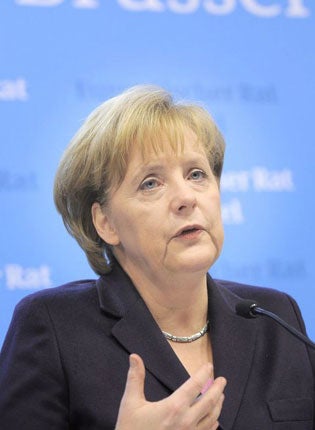EU leaders warned to beware new 'Iron Curtain'
Fears that protectionism will divide Continent dominate Brussels summit

Your support helps us to tell the story
From reproductive rights to climate change to Big Tech, The Independent is on the ground when the story is developing. Whether it's investigating the financials of Elon Musk's pro-Trump PAC or producing our latest documentary, 'The A Word', which shines a light on the American women fighting for reproductive rights, we know how important it is to parse out the facts from the messaging.
At such a critical moment in US history, we need reporters on the ground. Your donation allows us to keep sending journalists to speak to both sides of the story.
The Independent is trusted by Americans across the entire political spectrum. And unlike many other quality news outlets, we choose not to lock Americans out of our reporting and analysis with paywalls. We believe quality journalism should be available to everyone, paid for by those who can afford it.
Your support makes all the difference.European leaders have insisted that trade protectionism would not create a new economic "iron curtain" across the continent as they declared that the free market would help pull the member states out of recession.
They rejected moves yesterday to restrict the single market, despite reports of a split between the union's largest economies and the poorer states of eastern and central Europe.
EU nations agreed that governments should make sure that bailouts for banks or car makers should not be protectionist or hurt the economies of other members in the 27-nation bloc. A French scheme for a €6bn (£5.3bn) package of state loans to its carmakers in return for guarantees that they will not shift production elsewhere has prompted fears that EU governments will rush to protect their own industries at the expenses of others.
"People neither want protectionism nor do they want to be in a situation where we don't take the interest-rate and fiscal action that is necessary," said Gordon Brown after emergency talks in Brussels aimed at co-ordinating the response to the global economic crisis. "I found complete support for the measures that I am talking about that are central to the success of the G20." The G20 summit is being held in London in a month's time.
Mr Brown added: "Protectionism will mean less trade, less business and less jobs in the long run. When I talked about the importance of British workers, what I was talking about was how in an open, free-market, competitive economy we had to help workers get the skills that were necessary for the jobs of the future.
"I think what is happening in Europe is people are realising that if trade falls then businesses will collapse and then jobs will go. That is why the communiqué today is saying very clearly that protectionism is no answer to the current crisis."
The Czech Prime Minister, Mirek Topolanek, whose country holds the EU presidency until the end of June, said: "We agreed that as much as possible we should use the single market as a motor for growth." Earlier, the Hungarian Prime Minister, Ferenc Gyurcsany, warned that the recession could cause new divisions in Europe, two decades after the collapse of Communist rule in the east. "We should not allow a new 'Iron Curtain' to ... divide Europe into two parts," he said. "At the beginning of the Nineties we reunified Europe. Now it is another challenge – whether we can unify Europe in terms of financing and its economy."
The European Commission has backed the French car industry scheme, noting that the loans do not contain any formal conditions on the location of activities, but has said it will monitor events closely. Jose Manuel Barroso, the Commission president, said the 10 former Soviet bloc members of the EU did not want a special bailout programme for their region. He insisted they "do not want a programme just for them". However, Mr Topolanek said that the EU would not leave any nation "in the lurch".
World leaders at the G20 summit will be faced with strong demands to use the downturn to invest in green manufacturing jobs, action to cut global warming and development in the Third World. A coalition of trade unions and international aid organisations will stage a major demonstration in London before the summit to press their case for an end to the profit-driven policies of the past 20 years.
Join our commenting forum
Join thought-provoking conversations, follow other Independent readers and see their replies
0Comments